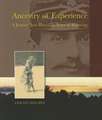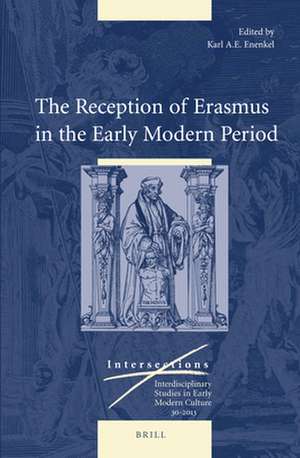The Reception of Erasmus in the Early Modern Period: Intersections, cartea 30
Editat de Karl A. E. Enenkelen Limba Engleză Hardback – 31 iul 2013
Contributors include: Philip Ford, Dirk Sacré, Paul J. Smith, Lucia Felici, Gregory D. Dodds, Hilmar M. Pabel, Reinier Leushuis, Jeanine De Landtsheer, Johannes Trapman, and Karl Enenkel.
Din seria Intersections
-
 Preț: 215.61 lei
Preț: 215.61 lei -
 Preț: 200.26 lei
Preț: 200.26 lei -
 Preț: 154.86 lei
Preț: 154.86 lei -
 Preț: 192.18 lei
Preț: 192.18 lei -
 Preț: 98.61 lei
Preț: 98.61 lei -
 Preț: 217.51 lei
Preț: 217.51 lei -
 Preț: 116.09 lei
Preț: 116.09 lei - 18%
 Preț: 1074.49 lei
Preț: 1074.49 lei -
 Preț: 241.64 lei
Preț: 241.64 lei -
 Preț: 241.64 lei
Preț: 241.64 lei -
 Preț: 228.96 lei
Preț: 228.96 lei -
 Preț: 229.55 lei
Preț: 229.55 lei -
 Preț: 241.64 lei
Preț: 241.64 lei -
 Preț: 226.67 lei
Preț: 226.67 lei -
 Preț: 107.21 lei
Preț: 107.21 lei -
 Preț: 208.79 lei
Preț: 208.79 lei -
 Preț: 201.78 lei
Preț: 201.78 lei -
 Preț: 226.85 lei
Preț: 226.85 lei -
 Preț: 225.71 lei
Preț: 225.71 lei -
 Preț: 246.63 lei
Preț: 246.63 lei -
 Preț: 228.96 lei
Preț: 228.96 lei - 47%
 Preț: 319.92 lei
Preț: 319.92 lei - 7%
 Preț: 315.66 lei
Preț: 315.66 lei -
 Preț: 96.10 lei
Preț: 96.10 lei - 18%
 Preț: 1201.75 lei
Preț: 1201.75 lei - 18%
 Preț: 659.69 lei
Preț: 659.69 lei - 18%
 Preț: 693.26 lei
Preț: 693.26 lei - 18%
 Preț: 1049.43 lei
Preț: 1049.43 lei - 18%
 Preț: 698.32 lei
Preț: 698.32 lei - 18%
 Preț: 681.99 lei
Preț: 681.99 lei - 18%
 Preț: 687.25 lei
Preț: 687.25 lei - 18%
 Preț: 820.59 lei
Preț: 820.59 lei - 18%
 Preț: 683.37 lei
Preț: 683.37 lei - 18%
 Preț: 667.86 lei
Preț: 667.86 lei
Preț: 691.17 lei
Preț vechi: 842.89 lei
-18% Nou
Puncte Express: 1037
Preț estimativ în valută:
132.25€ • 138.08$ • 109.46£
132.25€ • 138.08$ • 109.46£
Carte indisponibilă temporar
Doresc să fiu notificat când acest titlu va fi disponibil:
Se trimite...
Preluare comenzi: 021 569.72.76
Specificații
ISBN-13: 9789004255623
ISBN-10: 9004255621
Pagini: 275
Dimensiuni: 155 x 235 x 20 mm
Greutate: 0.56 kg
Editura: Brill
Colecția Brill
Seria Intersections
ISBN-10: 9004255621
Pagini: 275
Dimensiuni: 155 x 235 x 20 mm
Greutate: 0.56 kg
Editura: Brill
Colecția Brill
Seria Intersections
Cuprins
Acknowledgements
Notes on the Editor
Notes on the Contributors
List of Illustrations
Introduction – Manifold Reader Responses: The Reception of Erasmus in the Early Modern Europe
Karl Enenkel
PART I. HUMANISM
A Blueprint for the Reception of Erasmus: Beatus Rhenanus’s Second Vita Erasmi (1540)
Karl Enenkel
Medicinae laus per Eobanum Hessum ex Erasmo, versu reddita Reassessed
Dirk Sacré
PART II. RELIGIOUS IDEAS
Universalism and Tolerance in a Follower of Erasmus from Zurich: Theodor Bibliander
Lucia Felici
‘Betwixt Heaven and Hell’: Religious Toleration and the Reception of Erasmus in Restoration England
Gregory D. Dodds
Praise and Blame: Peter Canisius’s Ambivalent Assessment of Erasmus
Hilmar M. Pabel
PART III. POLITICAL IDEAS: IRENISM AND MIRROR OF A CHRISTIAN PRINCE
Erasmian Irenism in the Poetry of Pierre de Ronsard
Philip Ford†
On Good Government: Erasmus’s Institutio Principis Christiani versus Lipsius’s Politica
Jeanine De Landtsheer
PART IV. RABELAISIAN SATIRE, TRIUMPH, DIALOGUE AND OTHER ADAPTATIONS: RECEPTIONS OF THE PRAISE OF FOLLY IN FRENCH, ITALIAN AND DUTCH LITERATURE
Jean Thenaud and François Rabelais: Some Hypotheses on the Early Reception of Erasmus in French Vernacular Literature
Paul J. Smith
Antonio Brucioli and the Italian Reception of Erasmus: The Praise of Folly in Dialogue
Reinier Leushuis
Erasmus and the Radical Enlightenment: An Atheistic Adaptation of the Praise of Folly by Jan van der Wyck (1798)
Johannes Trapman
Index Nominum
Notes on the Editor
Notes on the Contributors
List of Illustrations
Introduction – Manifold Reader Responses: The Reception of Erasmus in the Early Modern Europe
Karl Enenkel
PART I. HUMANISM
A Blueprint for the Reception of Erasmus: Beatus Rhenanus’s Second Vita Erasmi (1540)
Karl Enenkel
Medicinae laus per Eobanum Hessum ex Erasmo, versu reddita Reassessed
Dirk Sacré
PART II. RELIGIOUS IDEAS
Universalism and Tolerance in a Follower of Erasmus from Zurich: Theodor Bibliander
Lucia Felici
‘Betwixt Heaven and Hell’: Religious Toleration and the Reception of Erasmus in Restoration England
Gregory D. Dodds
Praise and Blame: Peter Canisius’s Ambivalent Assessment of Erasmus
Hilmar M. Pabel
PART III. POLITICAL IDEAS: IRENISM AND MIRROR OF A CHRISTIAN PRINCE
Erasmian Irenism in the Poetry of Pierre de Ronsard
Philip Ford†
On Good Government: Erasmus’s Institutio Principis Christiani versus Lipsius’s Politica
Jeanine De Landtsheer
PART IV. RABELAISIAN SATIRE, TRIUMPH, DIALOGUE AND OTHER ADAPTATIONS: RECEPTIONS OF THE PRAISE OF FOLLY IN FRENCH, ITALIAN AND DUTCH LITERATURE
Jean Thenaud and François Rabelais: Some Hypotheses on the Early Reception of Erasmus in French Vernacular Literature
Paul J. Smith
Antonio Brucioli and the Italian Reception of Erasmus: The Praise of Folly in Dialogue
Reinier Leushuis
Erasmus and the Radical Enlightenment: An Atheistic Adaptation of the Praise of Folly by Jan van der Wyck (1798)
Johannes Trapman
Index Nominum
Recenzii
“meticulously researched […] The ten essays in this volume […] are splendidly introduced by editor Karl Enenkel and provide an illuminating look at the ways in which Erasmus was perceived, received, and his work appropriated in a variety of European contexts.”
Donald K. McKim, Germantown, Tennessee. In: Journal of Jesuit Studies, Vol. 1, No. 2 (2014), pp. 303-304.
"To understand how Erasmus was read, as this rich and illuminating collection shows, is to read and understand Erasmus anew."
Seth Lobis, Claremont McKenna College. In: Erasmus Studies, Vol. 34, No. 2 (2014), pp. 162-167.
Donald K. McKim, Germantown, Tennessee. In: Journal of Jesuit Studies, Vol. 1, No. 2 (2014), pp. 303-304.
"To understand how Erasmus was read, as this rich and illuminating collection shows, is to read and understand Erasmus anew."
Seth Lobis, Claremont McKenna College. In: Erasmus Studies, Vol. 34, No. 2 (2014), pp. 162-167.
Notă biografică
Karl Enenkel is Professor of Medieval Latin and Neo-Latin at the Westfälische Wilhelms-Universität Münster (Germany). Previously he was Professor of Neo-Latin at the University of Leiden (Netherlands). He has published widely on international Humanism, early modern organisation of knowledge, literary genres 1300-1600, and emblem studies.
